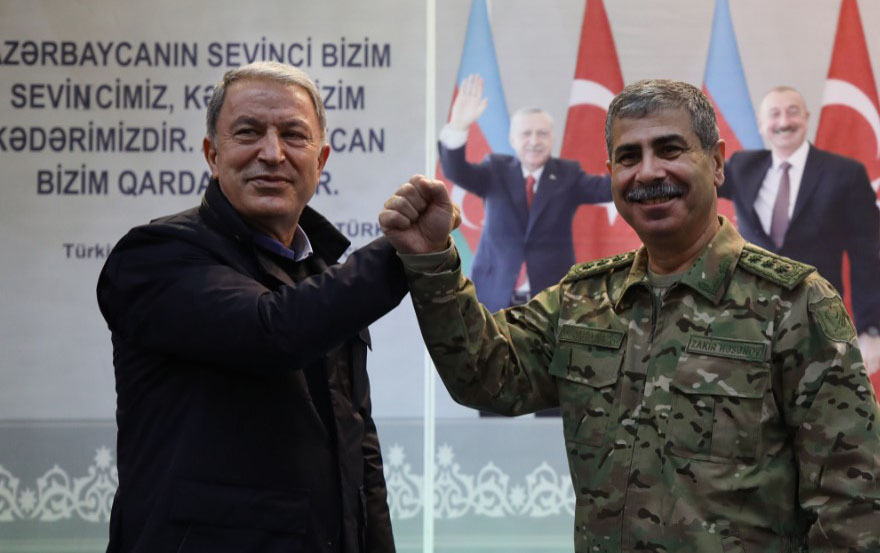The armed forces of Azerbaijan and Turkey are gearing up for a large-scale winter military drill in the far eastern Turkish province of Kars. The training, scheduled to take place February 1-12, will be the most comprehensive of its kind in recent years, according to Turkish media.
The Defense Ministry of Azerbaijan reported on Sunday that the troops and military vehicles of the Combined Arms Army deployed in Nakhchivan exclave of Azerbaijan have already been dispatched to Kars. The Turkish defense authorities confirmed the arrival of Azerbaijani forces in the province on the same day. Nakhchivan is an exclave on the southwest of Azerbaijan sharing a 15-kilometer borderline with Turkey.
According to a statement of the Turkish Ministry of National Defense published by the Turkish media, the key focus of the drill is testing operational possibilities and capabilities during severe weather conditions in winter, including practices of sheltering, reinforcement, maintenance and educational development. The military drills aim to improve cooperation and coordination during the execution of joint operations, to test the performance of weapons and vehicles in inventory, added newly to the inventory or those under development.
The extensive military drill of the joint troops will feature tank divisions, cannonries, sniper teams, personnel of the Special Forces Command, helicopters and commandos equipped primarily with the domestically-manufactured arms. Both militaries will practice the ground and air assaults, airborne operations and logistic support in snowy conditions.
The drill will be the first military warm-up for Azerbaijani forces since they concluded six-week-long clashes with Armenia's troops dubbed as the "Patriotic War". The recent clashes marked the most intense fighting between the two countries since the 1994 ceasefire. The war ended with a decisive victory of the Azerbaijani army and the liberation of historical and internationally recognized lands of Azerbaijan from the decades-long occupation of Armenia. Azerbaijan restored its sovereignty in over 300 settlements, including five major cities in its Karabakh region in the wake of the counter-attack operations codenamed "Iron Fist" from September 27 through November 9. The war ended in a tripartite ceasefire statement signed by Armenia, Azerbaijan and Russia on November 9. As part of the agreement, Armenia returned the occupied Aghdam, Kalbajar and Lachin districts to Azerbaijan by December 1.
The most recent military exercises joined by Turkish and Azerbaijani troops took place between July 29 and August 10 of last year. The drills followed an armed attack of the Armenian forces on the border positions of Azerbaijan in the country's western Tovuz district. Eleven servicemen, including a general of the Azerbaijani army, were killed in the attacks. The post-war exercises featured ground and air drills including artillery, armored vehicles, and mortars, as well as jets and helicopters executing multiple conditional tasks in the capital Baku and the second-largest Ganja city of Azerbaijan, and in Nakhchivan, Kurdamir and Yevlakh regions.
Azerbaijani President Ilham Aliyev said in a meeting with the Turkish Minister of National Defense, Army General Hulusi Akar shortly after the last year's drills that Baku and Ankara hold more than ten joint exercises each year, adding that such efforts demonstrate the unity and brotherhood of the two nations. For his part, Minister Akar said that joint military drills serve as a "laboratory where theory turns into practice."







 The number of evacuees from flooded areas in Kazakhstan has reached 97,852 people, including about 32,856 children since March 27.
The number of evacuees from flooded areas in Kazakhstan has reached 97,852 people, including about 32,856 children since March 27.
 The Islamic holy month of fasting, Ramadan comes to an end this week with the celebration of a joyous festival called Eid (meaning “festival” in Ar...
The Islamic holy month of fasting, Ramadan comes to an end this week with the celebration of a joyous festival called Eid (meaning “festival” in Ar...
 Iran's senior military leaders described the drone and missile attack on Israel on April 14 night as “successful".
Iran's senior military leaders described the drone and missile attack on Israel on April 14 night as “successful".
 Iranian President Ebrahim Raisi warned Israel that it would face a "real and extensive" response if it makes any "mistake" following Tehran’s missi...
Iranian President Ebrahim Raisi warned Israel that it would face a "real and extensive" response if it makes any "mistake" following Tehran’s missi...



